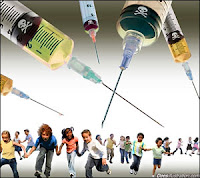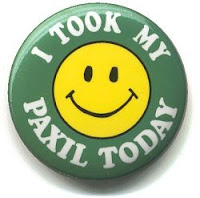 Question: What do you do if you are the pharmaceutical industry and the current health care climate is such that it will be harder to hold long-term patents, and people are getting hip to the dangers of lifestyle drugs?
Question: What do you do if you are the pharmaceutical industry and the current health care climate is such that it will be harder to hold long-term patents, and people are getting hip to the dangers of lifestyle drugs?
Answer: Why, step up your development of vaccinations, that’s what.
As I peruse the health news daily, it does not get past me that a very large percentage of stories (30% tonight) are on vaccinations–new ones for swine flu, cervical cancer and other illnesses, as well as finger-wagging at people who choose to not subject themselves or their children to new and untested vaccines. All of it rounded out by stories of the government pushing, pushing, pushing policies and legislation to inoculate us all, against everything. Who’s scared of this scenario, and who’s not? Who is in complete trust and confidence in this latest twist to the, “We the government care about the peoples’ health and well-being,” game?
The latest is the new findings that the human papilloma virus (HPV) is responsible for 50% of all penile cancers.* As a result, the drug-makers that manufacture the vaccine against HPV for girls, Merck and GlaxoSmithKline, say the vaccine can be also used in boys. What do you know? First it was 50% of schoolchildren that we can stick, now we get the other half. Who doesn’t see the rationale behind this?
 And if that isn’t scary enough, Health and Human Services Secretary, Kathleen Sebelius, has signed a decree granting vaccine makers total legal immunity from any lawsuits that result from any new “Swine Flu” vaccine. The vaccine is untested and new, and if anything goes wrong–tough titties; suck it up, it’s for the greater good.
And if that isn’t scary enough, Health and Human Services Secretary, Kathleen Sebelius, has signed a decree granting vaccine makers total legal immunity from any lawsuits that result from any new “Swine Flu” vaccine. The vaccine is untested and new, and if anything goes wrong–tough titties; suck it up, it’s for the greater good.
It’s simple: You need to know this stuff to understand where we can take control over our own health. If you think the government knows how to best take care of you, be my guest, Patriot. But if mandatory inoculations of your kids scares the crap out of you, better be prepared to say so.
*Penises blamed for 100%–bad penises, bad, bad…






















